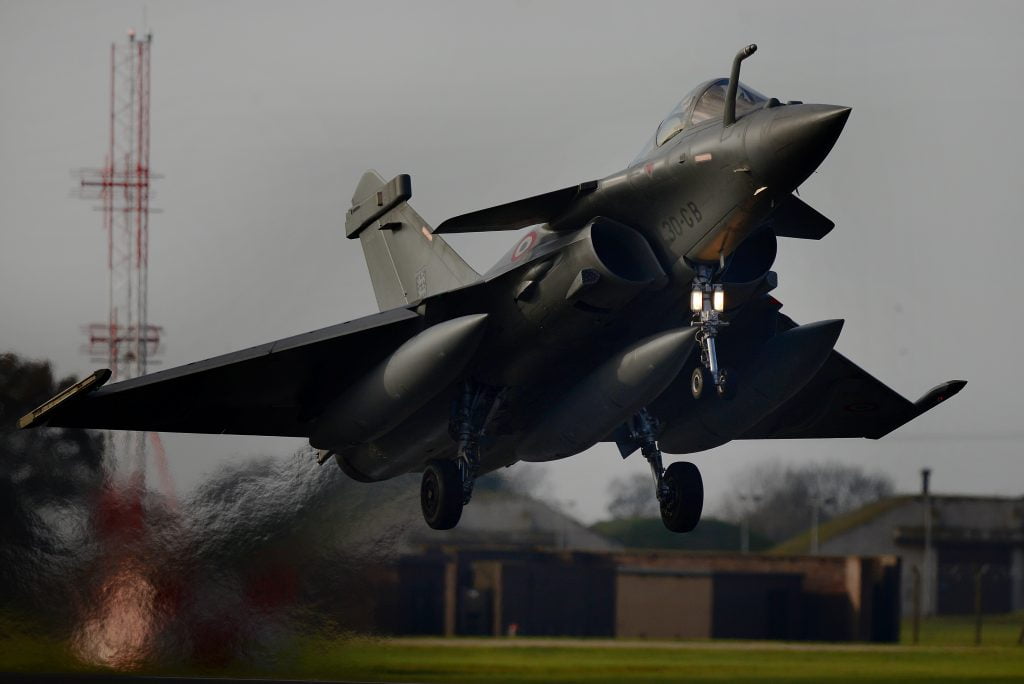By Robbin Laird
One can be forgiven if in looking at Macron’s France you focus on his emphasis on Europe and the prioritization of the next phase of European integration.
Yet at the same time, one is witnessing within France the very forces, which are undermining the capability to do so.
Yellow jackets are hardly the storm troopers for more European integration.
Nonetheless, one should not miss what the Macron Administration is doing to shape a global presence beyond Europe itself.
If France has a relatively modest force structure, why not do so with a global focus on defense industry?
What is also notable is that the sweep of three contracts in less than a month have not really been linked together in terms of France shaping a global posture, a somewhat post-Brexit but also post European integration effort as well.
All three contracts position France nicely but also challenge it significantly.
France will need to have the engineering talent to execute the contracts.
France will need to have the global management skills to manage the contracts as well as the conflicting interests implied by those three contracts.
France will need to balance the very different interests of partners in these three contracts.
France will need to shape a wide range of partnering approaches, techniques and means to succeed as well.
It is not just about exporting made-in France and partnering done along those lines to promote the national interest.
Finally, France will need to ensure that economic regression and social warfare don’t undercut the French industrial infrastructure necessary to succeed.
Or put another way, the three contracts also put France in the spotlight with any perceived successes or failures to be magnified on the world stage as well.
The Aussie Submarine
The first contract is with the Aussies to build a new submarine.
The submarine to be built has never been built; it will leverage the work of Naval Group, formerly DCNS, won both nuclear and conventional submarines.
For this contract to succeed, Naval Group and the Aussies will have to build capacity in Australia which is not there to design, build, and maintain a new class of submarines with the first arriving a decade or more away.
If successful, a French company would have a solid base in Australia from which to operate in the region and beyond.
Strategic Partnering Agreement for the Future Submarine Program from SldInfo.com on Vimeo.
FCAS
The second contract is with Germany to build a new air combat system in the 2040s.
For the French, this is about taking Dassault and several key French companies forward into the evolving world of air combat, notably Thales and Safran.

Airbus is the swing company straddling Germany and France with its role being sorted out.
Here the French are shaping a larger pool of money to work with and to build out from a pragmatic way ahead with regard to Rafale modernization.
The success of this venture will rest on France and Germany finding common solutions to airpower, something which has proven elusive in the past.
But building a common air system does pose a tough question for the two governments: Can they agree on a common and flexible arms export policy?
SAMI and Naval Group
The challenge of doing so is certainly brought to the fore by the third agreement.
The third agreement is with Saudi Arabia and the Naval Group and is about building an entirely updated or new infrastructure to build 21stcentury combat vessels.
The agreement is signed with Saudi Arabian Military Industries (SAMI) the new entity created by the Saudi ruler to craft a new defense industrial approach, akin to what the UAE has done, in order to build from Saudi Arabia rather than simply to import into Saudi Arabia.
This is the same ruler whom the German government is doing its best to sanction.
But clearly from the French point of view, building out capabilities in an allied Arab nation is worth the risk and any German blowback.
Let us be clear here – this is being done to support French national interests no matter how much the discourse about European sovereignty is launched from the Macron government’s spin machine.
The good news is that France is diversifying its global presence.
The bad news is that France is diversifying its global presence in the face of significant economic and social difficulties and conflicts.
But what Macron has done is to expand the landscape within which he and his successors can operate to perhaps get better maneuver room to deal with European allies like Germany or France’s own social challenges.
If you can build from Australia or Saudi Arabia, then what you need to build from France becomes a contextual issue, not a survival issue, thereby gaining some strategic maneuvering room for the French government.


